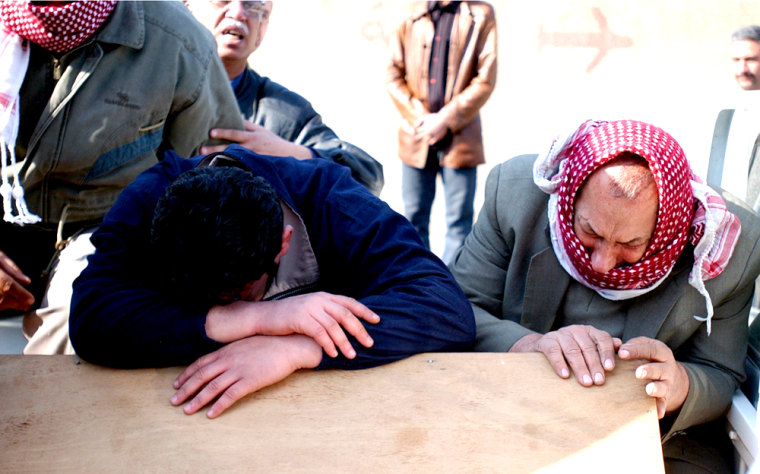Rebel strikes across Baghdad killed five people Thursday, including three paramilitary policemen and a government official, as insurgents continued their efforts to derail Iraq’s general election.
Among the dead was Qassim Mehawi, deputy director of the Communications Ministry, whose car was ambushed as he was driving to work, police said. Eight of Mehawi’s bodyguards were injured and were taken to a hospital.
Government officials are frequent targets of the insurgents, who accuse them of collaborating with the Americans.
A U.S. Marine, meanwhile, was “killed in action” Thursday while conducting security and stabilization operations in the volatile Anbar province west of Baghdad, the military said. More details were not released, and the Marine’s identity was withheld pending notification of relatives.
Insurgent offensive aimed at elections
The attacks in the capital were believed to be tied to an insurgent offensive aimed at disrupting planned elections Jan. 30 for the presidency and a 275-member National Assembly.
The official start of the campaign Wednesday was marred by a bombing of one of Shiite Islam’s holiest shrines in the southern city of Karbala.
The attack in the heartland of Iraq’s majority Shiite population killed eight people and wounded 40 others, including a prominent cleric, Sheik Abdul Mahdi al-Karbalayee.
Police reinforcements and National Guards were deployed to Karbala a day after the explosion, which local leaders said was an attempt by militants to fuel a civil war between the Shiites and the minority Sunnis.
In the other attacks Thursday, a roadside bomb exploded in western Baghdad near a passing sport-utility vehicle, badly damaging the SUV, police said. After the blast, gunmen opened up on the survivors with automatic fire, killing a foreigner and wounding two others, Al-Khadra Police Commissioner Ali Hussein Al-Hamadani said. There was no immediate information on the nationalities of the casualties.
Al-Hamadani said three Iraqi National Guardsmen died and six others were injured when another roadside bomb exploded in another attack in western Baghdad as their pickup truck was passing.
Al-Zarqawi in Baghdad?
The increasing number of attacks in the capital could be attributed to the presence of the feared Jordanian terrorist Abu Musab al-Zarqawi.
Lt. Gen. Lance Smith, deputy commander of U.S. Central Command, said Wednesday that al-Zarqawi was believed to be in Baghdad, where he could “operate pretty safely” by getting shelter from those in the city sympathetic to his cause.
He also said that al-Zarqawi’s ability to communicate with his network had been diminished by military operations, such as the offensive in Fallujah, but that the group continued to find innovative ways to coordinate attacks.
Al-Zarqawi’s group, known as Al-Qaida in Iraq, is believed to be leading a brutal campaign of hostage-takings, beheadings and bombings that victimize both Americans and Iraqis.
In other developments Thursday:
- Iraqi militants claimed to have shot and killed an Italian citizen after he tried to break through a guerrilla roadblock on a highway outside the insurgent stronghold of Ramadi and showed the blindfolded body of a foreigner to three Iraqi journalists.
The reporters were shown an Italian passport and Lebanese residency permit that identified the man as Salvatore Santoro. A document from the Italian Embassy in Beirut seeking an Iraqi visa for the man called him an aid worker helping Iraqi children. Italian officials said they were investigating the report.
- The U.S. military said the airport in Iraq’s second city, Basra, would open for international commercial and passenger traffic in July after a $4.9 million overhaul. International flights to Basra have been suspended since the 1991 Gulf War.
- U.S. and Iraqi security forces raided the Baghdad home of two Egyptian employees of an Iraqi mobile phone company belonging to Egypt’s telecommunications giant, Orascom, said Dina Abu Neda, a spokeswoman for Orascom Telecom.
Abu Neda said the U.S. and Iraqi forces also confiscated thousands of dollars from the men’s home. “We don’t know why they were detained. It came as a big surprise to us,” she said.
- A U.S. soldier was wounded when the tank he was riding in struck a mine near Beiji, 150 miles north of Baghdad, a military spokesman said.
- In the northern city of Kirkuk, several thousand Arab residents rallied in front of the governor’s office to demand that the elections be postponed. The protesters said they were worried that a campaign to return displaced Kurds to the city, where Saddam Hussein’s regime drove out many Kurds and replaced them with Arabs from other areas, would alter Kirkuk’s ethnic mix.
